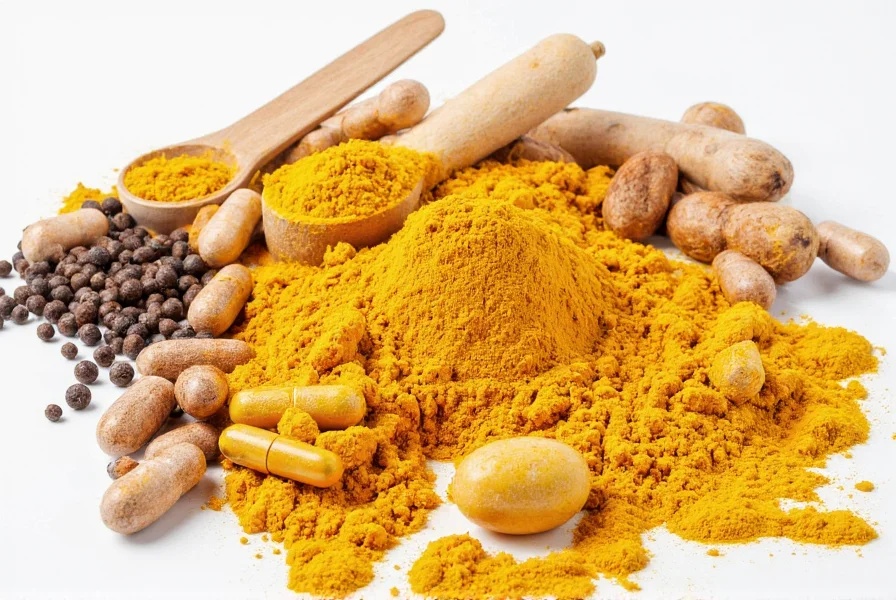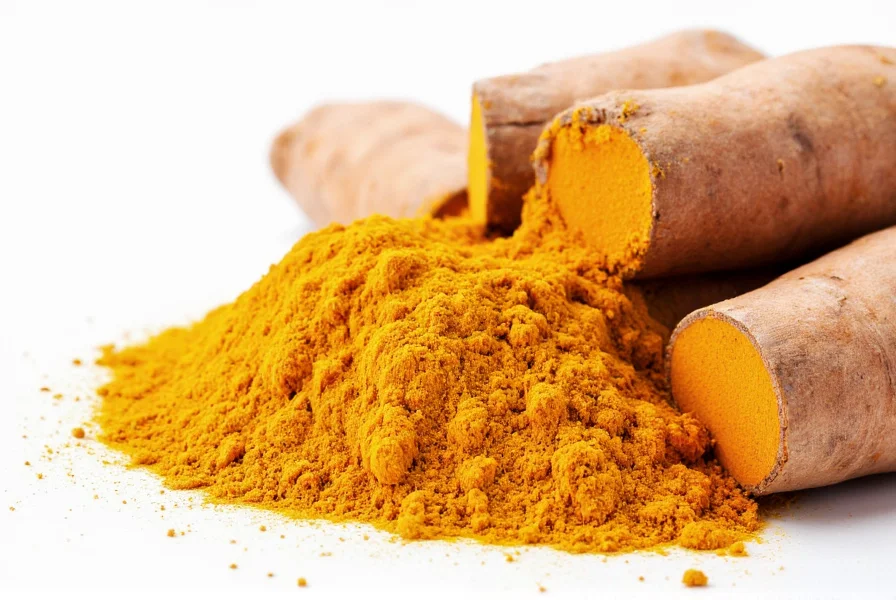When exploring turmeric and curcumin benefits, it's essential to distinguish between the spice itself and its most active compound. Turmeric, a vibrant yellow spice used for centuries in traditional medicine, contains only about 2-8% curcumin by weight—the compound responsible for most of its studied health effects. Understanding this distinction is crucial when evaluating scientific evidence for turmeric anti-inflammatory effects versus purified curcumin supplements.
The Science Behind Turmeric and Curcumin
Curcumin functions primarily as a potent antioxidant and anti-inflammatory agent. Unlike many antioxidants, it appears to both neutralize free radicals and stimulate the body's own antioxidant enzymes. Research published in the Journal of Medicinal Food indicates curcumin may influence more than 700 genes potentially involved in inflammation pathways.
However, a significant challenge with curcumin is its poor bioavailability—meaning the body struggles to absorb and utilize it effectively. When consumed alone, curcumin has limited absorption, rapid metabolism, and quick elimination. This explains why many curcumin supplements with enhanced absorption combine it with piperine (from black pepper) or use specialized delivery systems.
Evidence-Based Health Benefits
Let's examine the most researched potential benefits with appropriate scientific context:
| Benefit Area | Scientific Support Level | Key Research Findings |
|---|---|---|
| Joint Health | Strongest evidence | Multiple studies show reduced pain and improved function in osteoarthritis; comparable to some NSAIDs in some trials |
| Anti-Inflammatory Effects | Substantial evidence | Reduces inflammatory markers like CRP; effects observed at doses of 500-1500mg daily |
| Cognitive Function | Emerging evidence | Potential neuroprotective effects; may increase BDNF levels; human studies still limited |
| Cardiovascular Support | Preliminary evidence | May improve endothelial function; effects on cholesterol still inconclusive |
Joint Health: The Most Researched Benefit
Among the proven turmeric health benefits, joint health has the strongest scientific backing. A comprehensive review in the Journal of Medicinal Food analyzed multiple clinical trials and concluded that curcumin supplementation (typically 1,000 mg daily) significantly reduced pain and improved physical function in people with osteoarthritis. Some studies found it performed comparably to ibuprofen but with fewer gastrointestinal side effects.
Researchers believe curcumin works by inhibiting multiple inflammatory pathways simultaneously—unlike many pharmaceuticals that target single pathways. This multi-target approach to inflammation reduction may explain why some people experience noticeable relief from joint discomfort.
Understanding Research Limitations
While the potential benefits are promising, several important limitations exist in the current research:
- Study quality varies significantly—many studies have small sample sizes or methodological limitations
- Bioavailability challenges mean effective doses in studies often use enhanced formulations not available in regular turmeric
- Long-term effects remain understudied, with most clinical trials lasting 8-12 weeks
- Individual responses vary considerably based on genetics, health status, and other factors
When evaluating claims about curcumin health benefits for chronic conditions, it's important to recognize that most research shows modest effects rather than dramatic cures. The strongest evidence supports turmeric's role as a complementary approach alongside conventional treatments, not a replacement.
Safety Considerations and Potential Interactions
Turmeric consumed in culinary amounts is generally recognized as safe. However, high-dose curcumin supplements may cause:
- Digestive discomfort in some individuals
- Increased risk of bleeding when combined with blood-thinning medications
- Potential interactions with diabetes medications
- Contraindicated for people with gallbladder issues
The recommended daily dosage of curcumin for research purposes typically ranges from 500-2,000 mg of standardized extract, though optimal dosing remains an active research area. Always consult with a healthcare provider before starting any new supplement regimen, especially if you have existing health conditions or take medications.
Practical Recommendations for Turmeric Consumption
For those interested in incorporating turmeric into their wellness routine, consider these evidence-based approaches:
- Culinary use: Add 1-3 grams of turmeric powder to foods daily (about ½-1½ teaspoons)
- Enhance absorption: Combine with black pepper (which contains piperine) and healthy fats
- Supplement wisely: Look for products with proven bioavailability (like those with piperine or phospholipids)
- Manage expectations: View turmeric as complementary support, not a medical treatment
When selecting high-quality curcumin supplements, check for third-party testing certifications and standardized curcuminoid content (typically 95%). Be wary of products making extraordinary health claims, as legitimate supplements won't promise cures for serious medical conditions.

Conclusion: A Balanced Perspective on Turmeric Benefits
The scientific exploration of turmeric and curcumin health effects reveals a complex picture. While not a miracle cure, the evidence supports its potential as a natural anti-inflammatory agent with particular promise for joint health. The most realistic approach combines culinary use of turmeric with evidence-based expectations about its effects.
As research continues to evolve, the scientific community emphasizes that turmeric and curcumin should be viewed as complementary components of a healthy lifestyle rather than standalone treatments. Future studies focusing on standardized formulations and longer durations will provide clearer guidance on optimal use for specific health concerns.
Frequently Asked Questions
What's the difference between turmeric and curcumin?
Turmeric is the yellow spice (from the Curcuma longa plant) commonly used in cooking, while curcumin is the primary active compound within turmeric responsible for most of its studied health effects. Turmeric contains only about 2-8% curcumin by weight, which is why many studies use concentrated curcumin extracts rather than the whole spice.
How much turmeric should I take for inflammation?
For culinary use, 1-3 grams of turmeric powder daily (about ½-1½ teaspoons) in food is considered safe. For targeted anti-inflammatory effects, studies typically use 500-1,500 mg of standardized curcumin extract daily, often formulated with piperine to enhance absorption. Always consult with a healthcare provider before starting supplementation, especially if you have health conditions or take medications.
Can turmeric help with arthritis pain?
Multiple clinical studies suggest turmeric, particularly in the form of curcumin supplements, may help reduce arthritis pain and improve joint function. A review in the Journal of Medicinal Food found curcumin supplementation (typically 1,000 mg daily) significantly reduced pain and improved physical function in people with osteoarthritis, with some studies showing comparable results to ibuprofen but with fewer gastrointestinal side effects.
Why is curcumin poorly absorbed by the body?
Curcumin has naturally poor bioavailability due to limited absorption in the gut, rapid metabolism in the liver and intestinal wall, and quick systemic elimination. This means when consumed alone, very little curcumin actually reaches the bloodstream. This is why many effective supplements combine curcumin with piperine (from black pepper) or use specialized delivery systems to enhance absorption.
Are there any side effects of taking turmeric supplements?
Turmeric in culinary amounts is generally safe for most people. However, high-dose curcumin supplements may cause digestive discomfort in some individuals. More significantly, curcumin may interact with blood-thinning medications, diabetes drugs, and increase risk of bleeding. It's contraindicated for people with gallbladder issues. Always consult with a healthcare provider before starting any new supplement, especially if you have existing health conditions or take medications.











 浙公网安备
33010002000092号
浙公网安备
33010002000092号 浙B2-20120091-4
浙B2-20120091-4